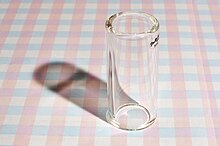
Back زجاج البوروسيليكات Arabic Borsilikatglas Danish Borosilikatglas German Vidrio borosilicatado Spanish شیشه بوروسیلیکات Persian Verre borosilicate French זכוכית בורוסיליקט HE बोरोसिलिकेट काँच Hindi Kaca borosilikat ID Vetro borosilicato Italian

Borosilicate glass is a type of glass with silica and boron trioxide as the main glass-forming constituents. Borosilicate glasses are known for having very low coefficients of thermal expansion (≈3 × 10−6 K−1 at 20 °C), making them more resistant to thermal shock than any other common glass. Such glass is subjected to less thermal stress and can withstand temperature differentials without fracturing of about 165 °C (300 °F).[1] It is commonly used for the construction of reagent bottles and flasks, as well as lighting, electronics, and cookware.
Borosilicate glass is sold under various trade names, including Borosil, Duran, Pyrex, Glassco, Supertek, Suprax, Simax, Bellco, Marinex (Brazil), BSA 60, BSC 51 (by NIPRO), Heatex, Endural, Schott, Refmex, Kimax, Gemstone Well, United Scientific, and MG (India).
Single-ended self-starting lamps are insulated with a mica disc and contained in a borosilicate glass gas discharge tube (arc tube) and a metal cap.[2][3] They include the sodium-vapor lamp that is commonly used in street lighting.[4][5][2][3]
Borosilicate glass usually melts at about 1,650 °C (3,000 °F; 1,920 K).
- ^ Cite error: The named reference
diffwas invoked but never defined (see the help page). - ^ a b "The Low Pressure Sodium Lamp".
- ^ a b "The Low Pressure Sodium Lamp".
- ^ "Lighting Comparison: LED vs High Pressure Sodium/Low Pressure Sodium". www.stouchlighting.com.
- ^ "The Sodium Lamp – How it works and history". edisontechcenter.org.